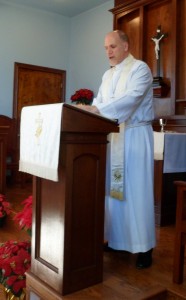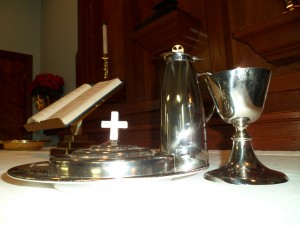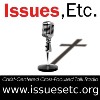
As he gives attention to the public reading of Holy Scripture, Pastor Galler honors the divinely-inspired St. Paul’s exhortation in 1 Timothy 4:13. Most services make use of Psalm verses and include one reading each from the Old Testament or Acts, a New Testament epistle or Revelation, and an account of the Gospel.
Like the prophets before Him, Jesus when He walked the earth taught and acted, and, through His Church, Jesus today continues both to teach and to act (see Acts 1:1-2). That twofold emphasis is reflected in the twofold structure of both the Divine Service (with both the Service of the Word and the Service of the Sacrament) and Martin Luther’s Small Catechism (first there are the Ten Commandments, the Apostolic Creed, and the Lord’s Prayer; then there are Holy Baptism, the Office of the Keys and Absolution, and the Sacrament of the Altar). As was the case with Jesus’s personal teaching of law and Gospel and acting through miraculous signs then, His vicarious teaching of law and Gospel and acting through Word and Sacrament today are intended to create and sustain faith in Him for the forgiveness of sins.
Usually when we think of God’s Word, the Bible comes to mind first. God inspired holy writers to record His Word in the Bible, which makes the Bible without error and perfect for clearly proclaiming all we need for salvation. In another sense, however, God’s Word is not limited to the Word of the Bible. Pastors who faithfully preach from the Bible provide a living voice of Jesus for His people still today. Through such reading of His Word and preaching, God the Holy Spirit creates faith when and where He chooses in those who hear the Gospel. The Holy Spirit calls us by the Gospel, enlightens us with His gifts, and thereby sanctifies and keeps us in the true faith. The Gospel by which the Holy Spirit calls us in one sense is all of Holy Scripture, which tells us the Good News about what God in His great love has done for us in Jesus Christ. (Romans 10 traces out well the sending of preachers for the end result of us hearing, believing, and being saved.) Thus, every worship service at Pilgrim features at least the reading of Holy Scripture, if not also a homily or sermon based on it. (Read and hear sermons preached at Pilgrim here.)

With the gift of a new flagon and chalice on Christmas Day 2012, Pilgrim returned to offering the blood of Christ from a common cup. Every Divine Service offers the forgiveness of sins in its most-concrete form: Christ’s Body and Blood in, with, and under bread and wine.
Our loving God not only provides the written and spoken Word, but He also attaches that Word to things that we can see, hear, smell, taste, and touch. When the Word is so attached to concrete things by God in order for His Church to give the forgiveness of sins, we call them “sacraments”. (The written and spoken Word of the Gospel and the Sacraments are also sometimes together called “the Means of Grace”.) Different definitions of the term “sacrament” may result in different numbers of sacraments, but generally in the Lutheran Christian tradition we speak of three sacraments.
Baptism is usually regarded as the first of the Sacraments, since it replaced Old Testament circumcision as the entrance rite into the Kingdom of God (Colossians 2:11-12). Through Baptism, God brings about the salvation of the person baptized, who, regardless of age, by faith receives the forgiveness of sins, rescue from death and the devil, and eternal salvation. Baptism connects us to Christ, makes us alive with Him, and also adopts us God’s children. (Various Bible passages speak of Baptism, such as Titus 3:5.) Newborn babies of Pilgrim families and any others desiring Baptism may seek it out at Pilgrim.
Faithful Lutherans will not object to calling Absolution the second Sacrament. Although the Preparation of the Divine Service may be what most today think of as Confession and Absolution, such group confession and group “absolution” was neither a part of the Divine Service nor otherwise widely practiced at the time of the Lutheran Reformation, which is one of the reasons why Pilgrim does not use the “absolution” formula at the beginning of its Divine Services. The more ancient form of Confession and Absolution is done on a particularized basis. A single sinner can privately and with full confidence confess to a pastor not only sins in general but also the sins that particularly trouble him or her, for the sake of the pastor’s absolving him or her as an individual, effecting his or her forgiveness, on Christ’s command and with His authority. (John 20:22-23 is a central passage showing Christ giving the authority to His apostles and thereby also to their successors.) Pilgrim’s pastor is more than willing and able to hear such private confession and to comfort a sinner with individual absolution. (See Lutheran Service Book pages 292-293 and come during the Study Hours at right or contact him to set up another time.)
The third Sacrament Lutherans recognize is the Lord’s Supper, also called “Holy Communion” or “the Sacrament of the Altar”. The true body and blood of Jesus Christ are really, physically present in, with, and under the bread and wine in this holy meal. The body and blood are so given in the bread and wine for the forgiveness of sins, life, and salvation. (Jesus’s own words are clear, as in Matthew 26:27-28.) So important are these gifts that the historic Christian Church offered the Lord’s Supper every Sunday and feast day, a practice to which the Lutheran Confessions also testify. Accordingly, Pilgrim presently offers the Lord’s Supper in the Divine Service every Sunday of the month, at which times the altar is open to those who have been instructed, examined, and absolved. (See Closed Communion.)
People often ask why the Word and Sacraments are so important if Christ has already won forgiveness and salvation for us on the cross and gives us those gifts by grace through faith. The answer is simple: the preaching of His Word, Baptism, Absolution, and the Supper are the ways that He distributes those gifts in order to bless those who are willing to receive them in faith and so pray for them. We cannot go to the literal cross some 2,000 years ago, but we can come here and now to find Christ where He promises to be—in His Word and Sacraments. Believing Christians necessarily receive Holy Baptism and Holy Communion (John 3:5; 6:53) and so meet together with the Church (Hebrews 10:22-25).

